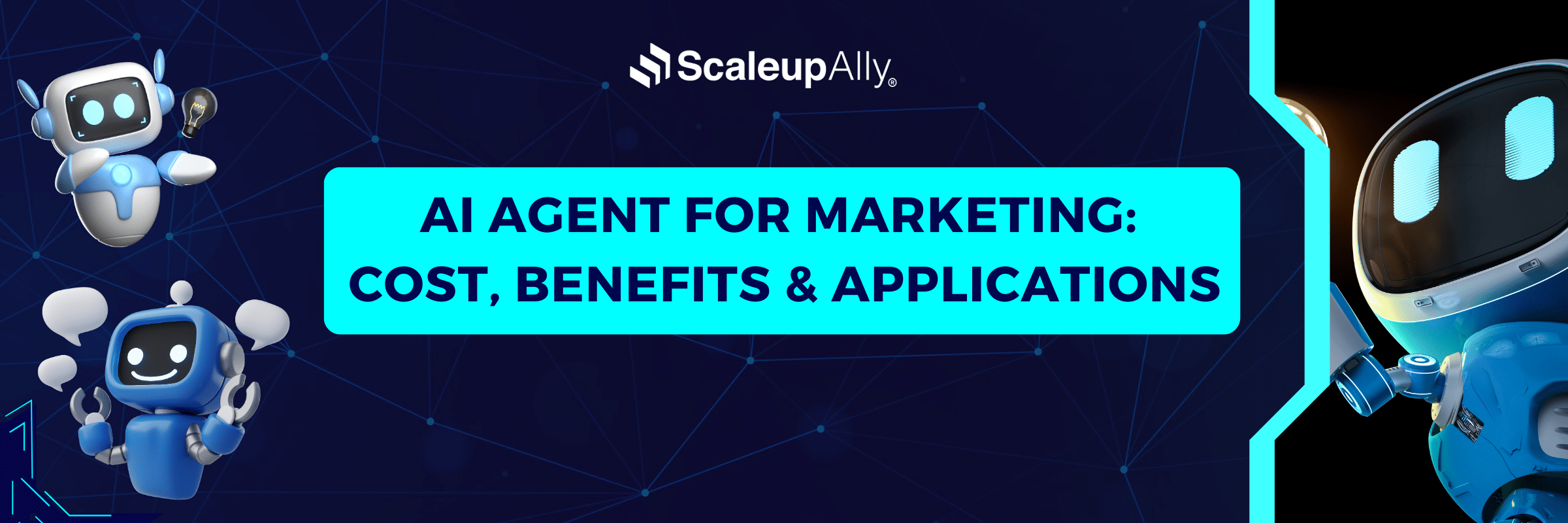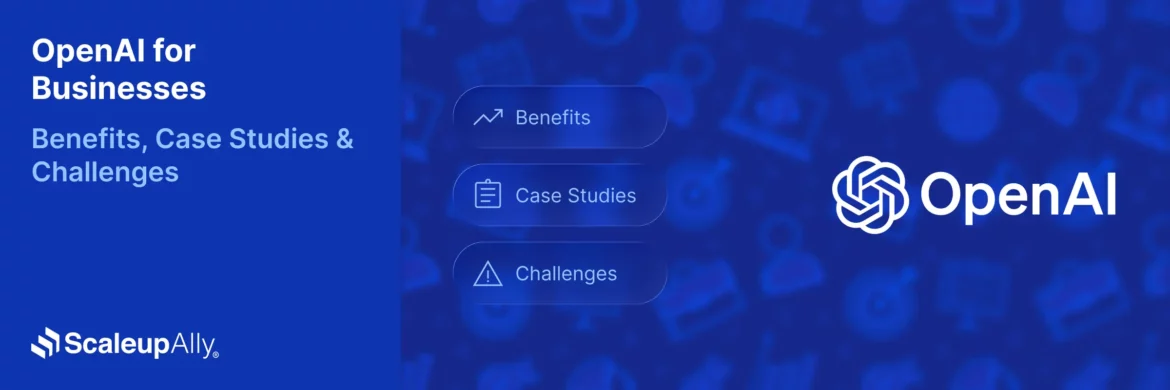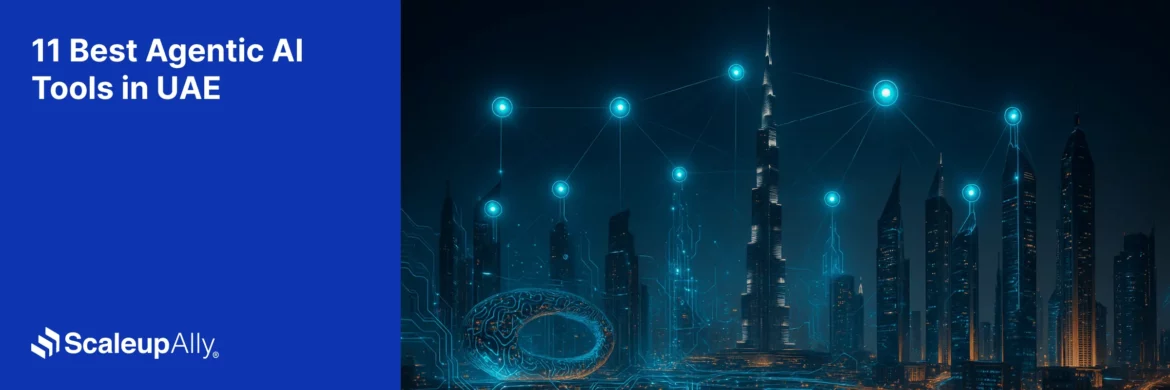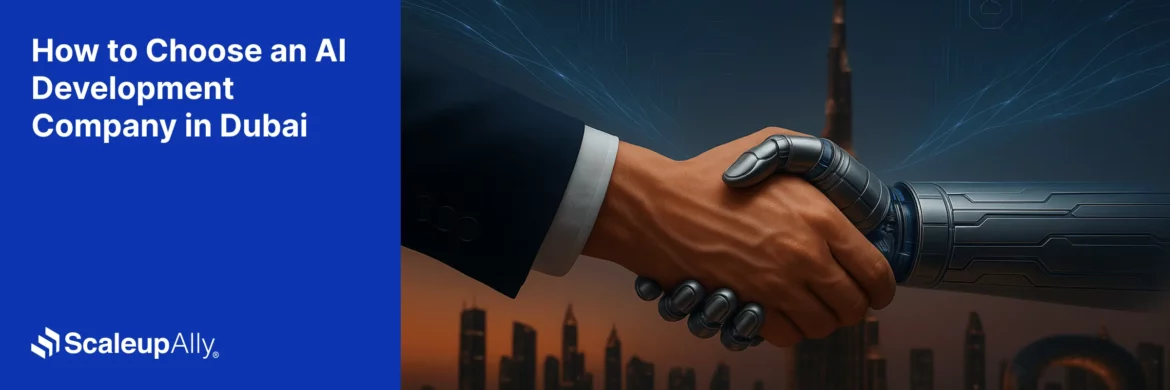
AI Agent for Marketing: Cost, Benefits & Applications
Manu Jain | May 2, 2025 , 8 min read
Table Of Content
AI marketing agents are reshaping the way businesses connect with customers, automate campaigns and drive better results. From improving personalization to boosting efficiency, these intelligent tools are quietly transforming marketing landscapes.
In this article, we’ll explore what AI agents for marketing are, how they work, their applications, benefits, costs and more.
Key Takeaways
- AI marketing agents automate repetitive tasks while enabling personalized customer engagement at scale.
- They come in various forms, from chatbots and recommendation engines to predictive analytics tools.
- AI marketing agents streamline processes, improve decision-making and boost marketing ROI.
- Their costs depend on complexity, integrations and customization needs—ranging from hundreds to tens of thousands annually.
- Small and large businesses alike can benefit from integrating AI agents into their marketing strategies.
What is an AI Agent for Marketing?
- What is an AI Agent for Marketing?
- How AI Agents Are Revolutionizing Marketing?
- Types of AI Marketing Agents
- How Do AI Marketing Agents Work?
- How to Implement AI Marketing Agents?
- 5 Applications of AI Marketing Agents
- 5 Benefits of AI Marketing Agents
- Cost of Implementing AI Agents for Marketing
- Conclusion
- Frequently Asked Questions
An AI agent for marketing refers to a software system that leverages artificial intelligence to automate, optimize, and enhance marketing tasks.
These agents can process data, make decisions and take actions aimed at achieving specific marketing goals—whether it’s generating leads, improving customer segmentation, or delivering personalized recommendations. They act as smart assistants to amplify marketing efforts.
How AI Agents Are Revolutionizing Marketing?
AI marketing agents are reshaping the marketing landscape by bringing automation, predictive insights, and personalization to the forefront. Traditionally, marketing required manual analysis of customer data, campaign adjustments, and audience targeting.
AI agents streamline these processes by analyzing vast datasets in real-time, predicting customer behaviors, and dynamically adjusting strategies.
For example, AI agents can automatically tailor email content for individual recipients, recommend products based on browsing history, or manage real-time bidding in digital advertising. This level of automation not only saves time but enables marketers to focus on strategy rather than repetitive execution.
By reducing human error and increasing speed, AI agents are elevating marketing precision and efficiency.
Types of AI Marketing Agents
AI marketing agents come in various forms, each tailored to specific marketing functions. Here are some of the main types:
1. Conversational AI Agents
Conversational AI agents, like chatbots and virtual assistants, engage directly with customers through messaging platforms or websites. They answer questions, guide users, handle support queries, and even assist in completing purchases—creating seamless interactions 24/7.
2. Predictive Analytics Agents
These agents analyze historical data to forecast future trends, customer behaviors, and campaign outcomes. Predictive analytics agents help marketers identify high-potential leads, predict churn, optimize pricing strategies, and allocate budgets more effectively.
3. Recommendation Engines
Recommendation engines are AI agents that personalize product or content suggestions based on user behavior and preferences. Found in platforms like Amazon and Netflix, they drive higher engagement, increase sales, and improve customer satisfaction through tailored recommendations.
4. Programmatic Advertising Agents
These AI agents automate the buying, placement, and optimization of digital ads in real-time. They evaluate audience data, bid on ad placements, and adjust campaigns dynamically to maximize ROI—without manual intervention.
5. Content Generation Agents
Content generation agents use natural language processing and machine learning to create written content, such as product descriptions, social media posts, or even blog articles. These tools help marketers scale content production while maintaining relevance and quality.
How Do AI Marketing Agents Work?
AI marketing agents work by combining machine learning algorithms, natural language processing, data analytics, and automation technologies to perform marketing tasks. They gather and process data from various sources—such as customer interactions, web analytics, CRM systems—and then use that data to make informed decisions or trigger specific actions.
For example, a recommendation engine analyzes browsing and purchase history to recommend products in real-time. A predictive analytics agent processes past campaign results to forecast which marketing channels will perform best for upcoming campaigns. Conversational agents use natural language understanding to interpret and respond to customer queries instantly.
These agents continuously learn and adapt from new data, improving accuracy and effectiveness over time. Their integration into marketing platforms allows seamless orchestration of campaigns across multiple channels, boosting personalization and responsiveness.
How to Implement AI Marketing Agents?
Here is a breakdown of how you can implement AI marketing agents:
- Define Goals: Identify specific marketing tasks or challenges you want to automate or improve (e.g., lead generation, customer engagement, campaign optimization).
- Evaluate Tools: Research available AI solutions that align with your goals. Consider scalability, integration options, ease of use, and vendor reputation.
- Integrate Data Sources: Ensure your CRM, website analytics, email marketing, and other systems are connected so the AI agent has access to relevant data.
- Customize and Train: Configure the AI agent to match your audience, products, and business needs. Feed it historical data to improve initial accuracy.
- Monitor and Optimize: Track performance metrics regularly. Use insights from the AI agent to refine strategies and continuously improve outcomes.
Starting with a pilot project can help minimize risks and demonstrate value before scaling across departments.
5 Applications of AI Marketing Agents
AI marketing agents have versatile applications across marketing functions. Here are five such real-world examples:
1. Personalized Email Campaigns
AI agents analyze customer data to send highly personalized emails tailored to user preferences, behaviors, and purchase history—improving open rates and conversions.
2. Chatbots for Customer Support and Sales
Conversational AI agents handle customer queries, qualify leads, schedule appointments, or guide customers through purchase funnels, reducing reliance on human support teams.
3. Predictive Lead Scoring
AI agents assess and score leads based on data like website behavior, engagement patterns, and demographics, allowing sales teams to prioritize high-intent prospects.
4. Dynamic Pricing Optimization
AI-powered pricing agents analyze demand, competitor pricing, and market trends to recommend optimal prices in real-time, maximizing margins and sales.
5. Social Media Listening and Sentiment Analysis
AI agents monitor social media platforms for brand mentions, customer sentiment, and trending topics—enabling proactive responses and campaign adjustments.
5 Benefits of AI Marketing Agents
- Increased Efficiency: Automate repetitive marketing tasks to free up human resources for strategy and creative work.
- Enhanced Personalization: Deliver highly tailored experiences across channels, improving engagement and customer loyalty.
- Data-Driven Decisions: Gain actionable insights from large datasets to inform better marketing strategies and targeting.
- Cost Savings: Reduce manual labor and operational inefficiencies, leading to lower marketing costs over time.
- Scalability: Easily expand marketing efforts without proportionally increasing headcount or resources.
Cost of Implementing AI Agents for Marketing
The cost of implementing AI marketing agents can vary widely depending on factors like tool complexity, level of customization, vendor pricing, integrations, and scale of use.
Software Licensing
Basic AI marketing tools (e.g., chatbots, predictive analytics platforms) can cost between $50 to $500 per month for small businesses. Enterprise-grade solutions with advanced features may range from $1,000 to $10,000 per month or more depending on capabilities.
Development and Customization
If building a custom AI agent or heavily customizing an existing platform, expect additional development costs ranging from $5,000 to $100,000+, depending on complexity and vendor involvement.
Integration Costs
Integrating AI agents with CRM systems, marketing automation platforms, and data warehouses may incur one-time integration fees of $1,000 to $20,000 depending on technical scope.
Training and Onboarding
Initial training, onboarding, and staff education might require $500 to $5,000 investment to ensure smooth adoption and operation.
Maintenance and Support
Ongoing maintenance, updates, and vendor support typically add 10–20% of the annual licensing cost per year.
Businesses should also factor in indirect costs, like data cleaning or process adjustments, to fully realize AI benefits.
In total, small businesses might spend $5,000–$20,000 annually, while large enterprises could see investments upward of $100,000 annually depending on scale and complexity.
Conclusion
AI marketing agents are transforming how businesses connect with customers, manage campaigns and drive results. By automating tasks, enabling personalization and generating actionable insights, they empower marketers to work smarter and faster.
As adoption grows, these intelligent tools will play an even bigger role in shaping the future of marketing strategies.
Get in touch with ScaleupAlly to leverage the power of Gen AI development services and solutions, and make your marketing efforts smoother and more effective than ever before.
Frequently Asked Questions
Q: How do AI agents improve marketing performance?
AI agents improve marketing by automating repetitive tasks, delivering personalized experiences, optimizing campaigns in real-time and providing predictive insights for better decision-making.
Q: Are AI marketing agents suitable for small businesses?
Yes—many AI marketing agents offer affordable pricing tiers and scalable features, making them accessible and valuable for small businesses aiming to boost efficiency and customer engagement.
Q: Can AI replace human marketers?
AI marketing agents enhance human efforts as opposed to replacing them. They handle repetitive or data-heavy tasks so that humans can focus on strategy, creativity and build authentic customer relationships.
Related Blogs

OpenAI for Businesses [Benefits, Use Cases & Challenges]
Discover the benefits of OpenAI for businesses. From reducing costs to scaling operations and enriching customer experiences. Real-world use cases included.
ScaleupAlly Team
Dec 16 ,
11 min read

Best 11 Agentic AI Tools in UAE: Accelerating Digital Transformation
Discover the top 11 agentic AI tools in UAE for 2025. Explore features, benefits, and tips to choose the right AI tool for your business growth.
Manu Jain
Nov 6 ,
9 min read

How to Choose an AI Development Company in Dubai: A Complete Guide
Find out how to choose the right AI development company in Dubai. Learn key factors, local considerations, and tips to select the best partner.
Manu Jain
Nov 6 ,
9 min read


